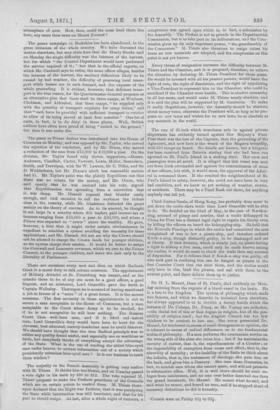• The grant to Prince Arthur was introduced into the
House of Commons on Monday, and was opposed by Mr. Taylor, who moved the rejection of the resolution, and by Mr. Dixon, who moved a reduction of the sum from £15,000 to £10,000 a year. On the division, Mr. Taylor found only eleven supporters,—Messrs. Anderson, Candlish, Carter, Fawcett, Lewis, Mellor, Samuelson, 'Smith, and Trevelyau, with Sir IV. Lawson, Sir C. Dilke, and Sir D. Wedderburn, but Mr. Dixon's niuch less reasonable motion had 51. Mr. Taylor's point was the plainly Republican one that 'there was no return for the money, and Mr. Dixon, who said openly that he was coerced into his vote, argued that Republicanism was spreading from a conviction that at was cheap. Mr. Disraeli exposed that blunder easily 'enough, and took occasion to call the workmen the richest -class in the country, while Mr. Gladstone defended the grant mainly on the theory of contract. As to its amount, he thought 'it not large in a country where 800 traders paid income-tax on 'incomes ranging from £10,000 a year. to £50,000, and where a Prince was expected to " tower " above the wealthy. He gave, 'however, a hint that it might under certain circumstances be expedient to establish a system avoiding the necessity for these applications; and Mr. Disraeli did not see why the Crown should not be allowed to charge the Crown lands for younger children, as the squirm charge their estates. It would be better to assign the Cornwall and Lancaster revenues, which we owe to the Prince 'Consort, to the younger children, and leave the heir only to the liberality of Parliament.
































 Previous page
Previous page